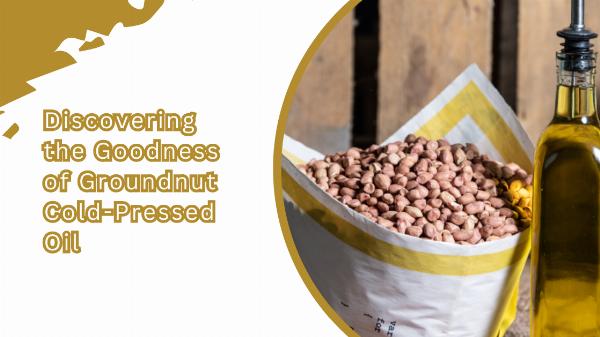Discovering the Goodness of Groundnut Cold-Pressed Oil

In recent years, as we become increasingly conscious of our health and the quality of the products we consume, traditional oils like groundnut cold-pressed oil have gained significant attention. This resurgence is not just a trend but a return to time-tested practices that offer numerous health benefits.
What is Groundnut Cold-Pressed Oil?
Groundnut oil, also known as peanut oil, is extracted from peanuts through a process called cold pressing. Unlike refined oils that undergo extensive processing and high heat extraction methods, cold-pressed oils are extracted at lower temperatures, typically below 50 degrees Celsius. This gentle extraction method helps retain the natural flavor, aroma, and nutritional value of the oil.
Nutritional Benefits
High in Healthy Fats: Groundnut oil is rich in monounsaturated and polyunsaturated fats, which are considered heart-healthy fats. These fats help in lowering bad cholesterol levels (LDL) and increasing good cholesterol levels (HDL), thereby reducing the risk of heart diseases.
Antioxidants: Cold-pressed groundnut oil retains antioxidants such as vitamin E and phytosterols, which have anti-inflammatory properties and help in neutralizing free radicals, protecting the cells from damage.
Vitamins and Minerals: It contains essential nutrients like vitamin B complex, vitamin E, magnesium, potassium, and zinc, which play crucial roles in various bodily functions, including metabolism and immune support.
Culinary Delight
Apart from its health benefits, groundnut cold-pressed oil is prized for its distinct nutty flavor and aroma. It has a high smoke point, making it suitable for various cooking methods, including frying, sautéing, and even baking. Its flavor profile enhances both traditional and contemporary dishes, from stir-fries to salad dressings, adding a unique depth that enhances the overall culinary experience.
Eco-Friendly and Sustainable
Cold pressing is an environmentally friendly method as it does not involve heat or chemicals that can harm the environment. The process retains the natural integrity of the oil without compromising its nutritional quality, making it a sustainable choice for health-conscious consumers.
Choosing Quality Cold-Pressed Oil
When selecting groundnut cold-pressed oil, opt for reputable brands that prioritize quality and transparency in their production processes. Look for certifications that ensure the oil is free from additives, preservatives, and solvent residues. Cold-pressed oils should ideally be stored in dark glass bottles to protect them from light and preserve their freshness.
Culinary Uses and Beyond
Beyond its culinary applications, groundnut cold-pressed oil is also used in skincare and hair care due to its moisturizing and nourishing properties. Its rich texture makes it an excellent carrier oil for essential oils in aromatherapy practices as well.
Conclusion
In conclusion, groundnut cold-pressed oil stands out not only for its nutritional benefits but also for its versatility and sustainable production methods. Incorporating this oil into your cooking regimen not only enhances the flavors of your dishes but also contributes to your overall well-being. As we continue to embrace healthier lifestyles, rediscovering the goodness of traditional oils like groundnut cold-pressed oil proves to be a nourishing choice for both body and soul. Whether you're exploring new recipes in the kitchen or seeking natural alternatives for personal care, the virtues of this oil make it a valuable addition to any conscientious consumer's pantry.
Note: IndiBlogHub features both user-submitted and editorial content. We do not verify third-party contributions. Read our Disclaimer and Privacy Policyfor details.


